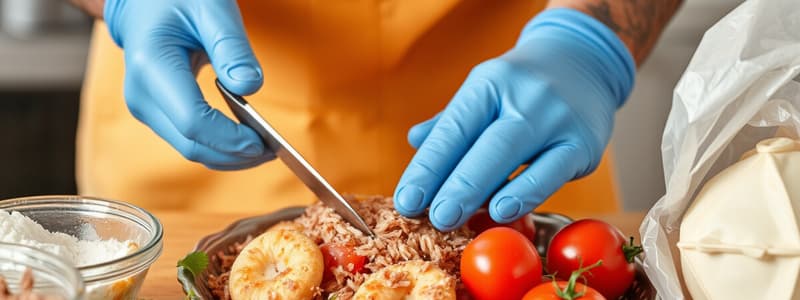Podcast
Questions and Answers
What are the three types of hazards that make food unsafe?
What are the three types of hazards that make food unsafe?
- Biological
- Chemical
- Physical
- All of the above (correct)
Bacteria, viruses, parasites, and fungi that cannot be seen, tasted or smelled are known as?
Bacteria, viruses, parasites, and fungi that cannot be seen, tasted or smelled are known as?
Pathogens
What type of hazard is a food handler spilling sanitizer into the fryer?
What type of hazard is a food handler spilling sanitizer into the fryer?
Chemical
A food handler cleans dirty dishes using hot water and then puts them away with the rest of the clean dishes. This is an example of?
A food handler cleans dirty dishes using hot water and then puts them away with the rest of the clean dishes. This is an example of?
A food handler washes hands and changes gloves after prepping hamburgers and before chopping lettuce. The food handler is?
A food handler washes hands and changes gloves after prepping hamburgers and before chopping lettuce. The food handler is?
A food handler who was called away while prepping a bowl of fruit put the bowl of fruit in the cooler. This is an example of?
A food handler who was called away while prepping a bowl of fruit put the bowl of fruit in the cooler. This is an example of?
A food handler uses different cutting boards to chop raw beef and slice melons. This is an example of?
A food handler uses different cutting boards to chop raw beef and slice melons. This is an example of?
The proper order of steps of handwashing are __________.
The proper order of steps of handwashing are __________.
During the hand washing process, you should scrub for how long?
During the hand washing process, you should scrub for how long?
Hands should be dried with?
Hands should be dried with?
When should hand antiseptics be used?
When should hand antiseptics be used?
Food handlers should wash their hands before?
Food handlers should wash their hands before?
Hand washing sinks are used for?
Hand washing sinks are used for?
Is it acceptable to place dirty pans in the hand washing sink because there is no room in the three-compartment sink?
Is it acceptable to place dirty pans in the hand washing sink because there is no room in the three-compartment sink?
What jewelry can food handlers wear while working?
What jewelry can food handlers wear while working?
If a food handler does not have time to get a clean apron before the shift starts, what should they do?
If a food handler does not have time to get a clean apron before the shift starts, what should they do?
Food handlers must tell the manager when they have what symptom?
Food handlers must tell the manager when they have what symptom?
Pathogens grow well in what temperature range?
Pathogens grow well in what temperature range?
Which of the following foods needs time and temperature control?
Which of the following foods needs time and temperature control?
Before use, a thermometer must be?
Before use, a thermometer must be?
Where should a food handler check the temperature of food?
Where should a food handler check the temperature of food?
Cold foods must be kept at?
Cold foods must be kept at?
If a pot of soup registers 139 degrees on the thermometer, is it safe to serve?
If a pot of soup registers 139 degrees on the thermometer, is it safe to serve?
How do you label ready to eat foods that have been prepped?
How do you label ready to eat foods that have been prepped?
If a food is labeled 'Fish: use by today,' what should you do?
If a food is labeled 'Fish: use by today,' what should you do?
The transfer of pathogens from one surface to another is known as?
The transfer of pathogens from one surface to another is known as?
Can you hold utensils by the part that touches the food?
Can you hold utensils by the part that touches the food?
What should a food handler do if they are in a hurry and cannot find the ice scoop?
What should a food handler do if they are in a hurry and cannot find the ice scoop?
Where should a cleaning/sanitizing towel be stored when not being used?
Where should a cleaning/sanitizing towel be stored when not being used?
If you suspect that juice from raw ground beef has dripped onto strawberries, what should you do?
If you suspect that juice from raw ground beef has dripped onto strawberries, what should you do?
If you suspect that a food item has been contaminated, what should you do?
If you suspect that a food item has been contaminated, what should you do?
What are the three most common food allergies?
What are the three most common food allergies?
If a customer is served a dairy product and is allergic to dairy but did not tell the server until being served, what should the server do?
If a customer is served a dairy product and is allergic to dairy but did not tell the server until being served, what should the server do?
Surfaces that touch food must be?
Surfaces that touch food must be?
Cleaning and sanitizing food contact surfaces helps reduce?
Cleaning and sanitizing food contact surfaces helps reduce?
What must be stored away from all food?
What must be stored away from all food?
How do you know that a sanitizer will work well?
How do you know that a sanitizer will work well?
Where should you clean a garbage can?
Where should you clean a garbage can?
If you notice signs of pest infestation, when should you tell the manager?
If you notice signs of pest infestation, when should you tell the manager?
Droppings that look like grains of black pepper are a sign of?
Droppings that look like grains of black pepper are a sign of?
Flashcards are hidden until you start studying
Study Notes
Food Safety Hazards
- Three main types of hazards that make food unsafe: biological, chemical, and physical.
- Pathogens are harmful microorganisms such as bacteria, viruses, parasites, and fungi that cannot be seen, tasted, or smelled.
Chemical Hazards
- Spilling sanitizer into a fryer creates a chemical hazard.
- Chemicals must be stored away from food to avoid contamination.
Cleaning and Sanitizing
- Poor cleaning procedures lead to unsafe food practices, such as mixing dirty and clean dishes.
- Cleaning and sanitizing food contact surfaces reduces pathogens to safe levels.
Personal Hygiene
- Food handlers demonstrate good personal hygiene by washing hands after handling raw foods and changing gloves appropriately.
- Hand washing should follow a specific process: wet, apply soap, scrub for 10-15 seconds, rinse, and dry with a single-use paper towel.
Time and Temperature Control
- Storing potentially hazardous food, like a bowl of fruit, in a cooler represents effective time and temperature control.
- Foods that require strict temperature control include fried chicken, which must be kept at safe temperatures (41°F or lower for cold food, 135°F or higher for hot food).
Handwashing Procedures
- Hand washing sinks are designated for hand washing only and should not be used for other tasks.
- Thermometers must be washed, rinsed, and sanitized before use; food temperature should be checked in the thickest part.
Food Labels and Allergies
- Ready-to-eat foods must be labeled with the name and use-by date.
- Common food allergies include eggs, peanuts, and shellfish; servers must act immediately if a food allergy is identified.
Cross-Contamination Prevention
- Using separate cutting boards for raw meats and fresh produce prevents cross-contamination.
- Pathogen transfer from one surface to another is known as cross-contamination, which must be avoided.
Pest Management
- Signs of pest infestation should be reported to a manager immediately.
- Droppings similar to grains of black pepper indicate cockroach presence.
Miscellaneous Guidelines
- Utensils should not be held by the parts that touch food to prevent contamination.
- Always use proper tools, such as an ice scoop, to handle food items like ice.
- Chemicals must be handled safely and kept away from food at all times.
Studying That Suits You
Use AI to generate personalized quizzes and flashcards to suit your learning preferences.




